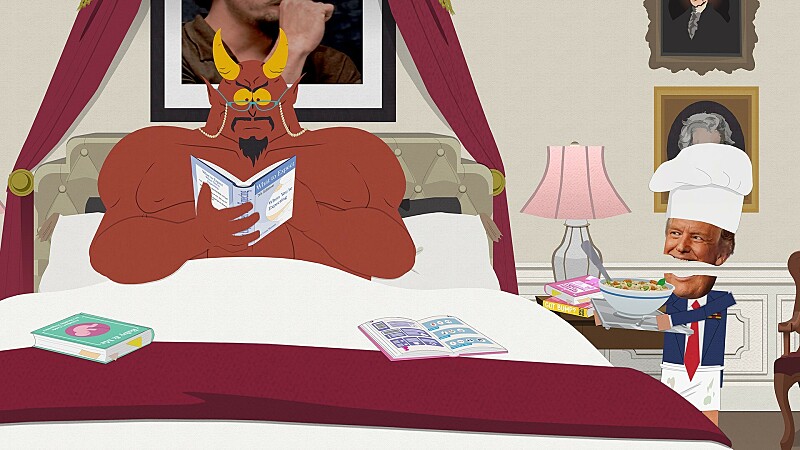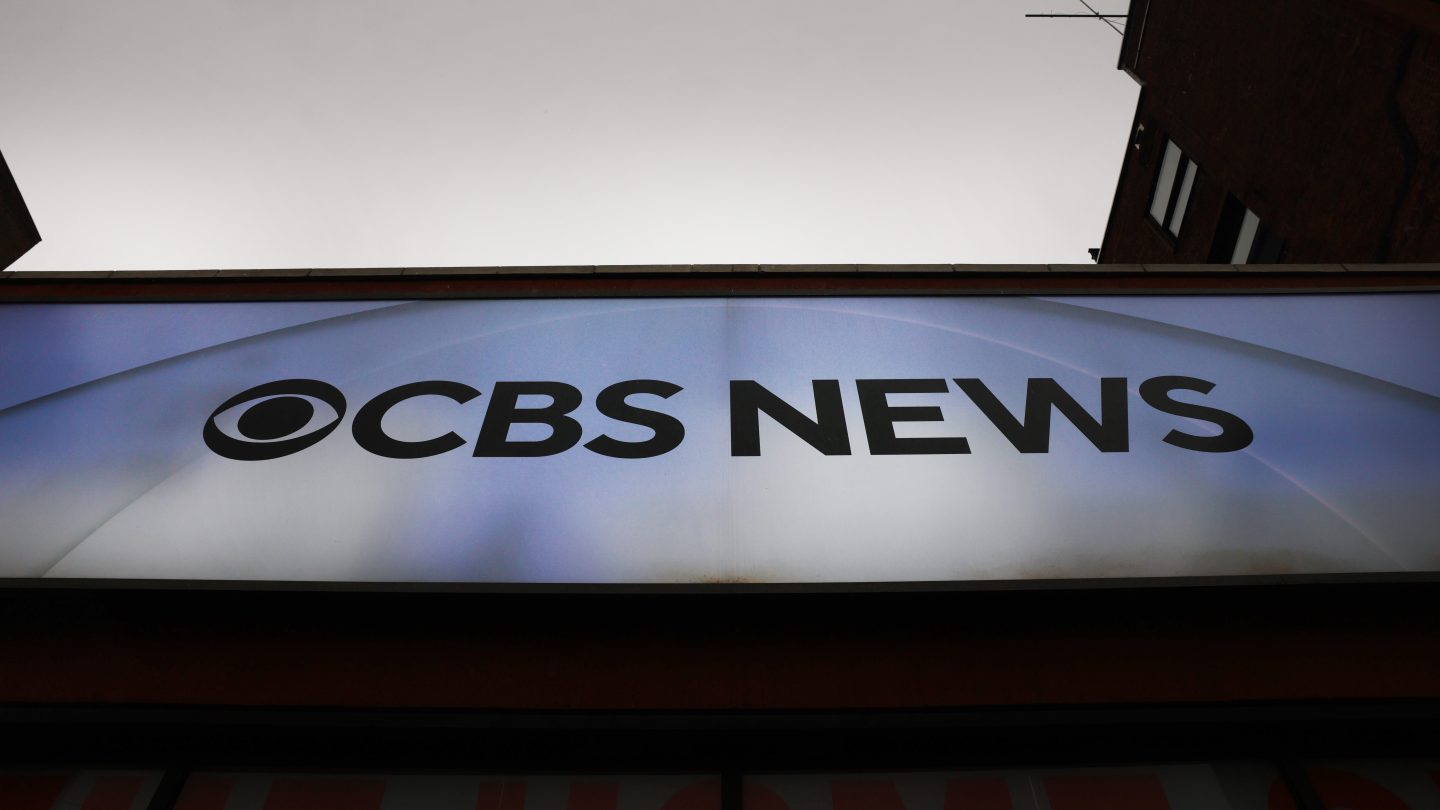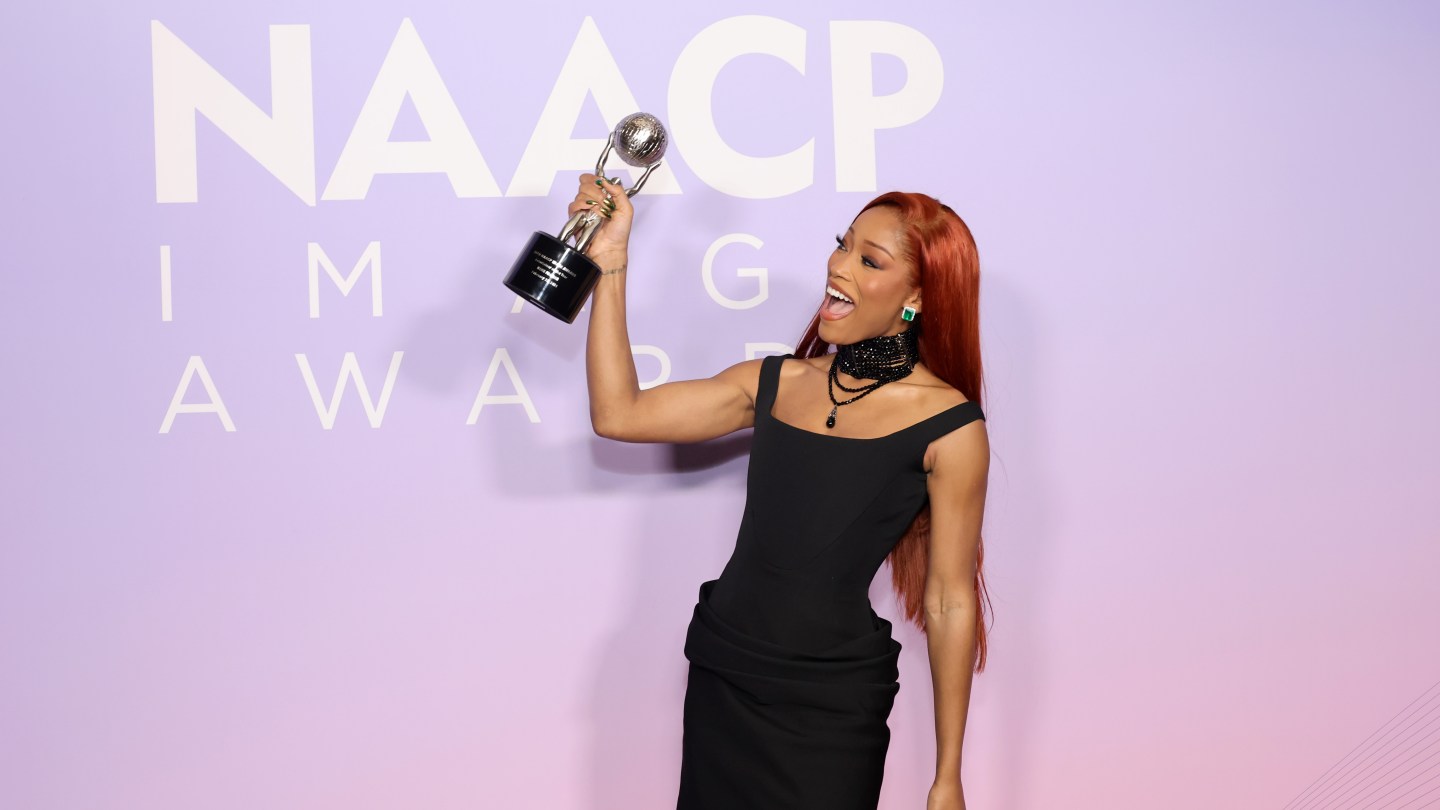Months after the second Trump administration took shape and the president’s flurry of executive orders began to generate the chilling effects of potential authoritarianism, South Park fearlessly kicked off with an almost unbelievably shocking moment. Struggling through the desert, an actor portraying the president of the United States lying naked and sunstroked, desperate to deliver America’s voters from temptation, listened to an endorsement message from his tiny, talking penis. Months later, South Park’s latest run now looks like it will conclude with the leader of the free world fathering the Antichrist via his extramarital affair with Satan. In between, South Park’s flapping-head cut-out depiction of Donald Trump — petulant, philandering, self-serving and deceptive to all — has made clandestine attempts to abort his unborn child and bedded his VP in the Lincoln Bedroom and then manipulated the media into believing footage of the tryst was a mere deepfake.
In a political era defined by Trump’s reactionary take-downs of anything and everything that disagrees with his worldview, bruises his ego or contradicts the MAGA agenda, an acid-tongued tweet or fireball of a Truth Social post would be expected to land on the desks of South Park masterminds Trey Parker and Matt Stone. Yet, as was seen during Trump’s first presidential term, when the hit show used its complex teacher character Mr. Garrison as a stand-in for Trump, the president has been radio silent in response to what has become, without a doubt, his harshest, most controversial and hands-down funniest lampoonings. At the same time, he appears to have gone to great lengths to decimate the late night comics who jab at him day over day, in a campaign that seems to have taken one scalp and nearly taken another. In fact, for a decade, Trump has not hesitated to launch midnight broadsides at everyone from Robert De Niro to Nordstrom. So, what makes South Park, which has enjoyed record-breaking viewership across its last two back-to-back seasons, so untouchable in the vengeful eyes of the leader of the free world?
Comic and actor Patton Oswalt recently offered an opinion on this in an appearance on The Daily Beast’s podcast, The Last Laugh. The anti-MAGA comic — whose new audio-only special opens with a mock disclaimer that to avoid the aforementioned authoritarian blowback, he’s now a Trump loyalist — offered that blockbuster ratings and the almighty dollar are some of the few things that can keep Trump’s claws from coming out.
“South Park — not only does it make an insane amount of money, it [also] gets insane ratings. And Trump can only be so angry at that, because what Trump ultimately will respect, even if it doesn’t respect him, is something where the numbers are through the roof, and the money is through the roof,” the comedian said, later adding. “Something that is as massive and as undeniable as South Park, both in quality, which people like you and I can see, but then in numbers and money, which Trump can see, he just falls silent. If Colbert was making South Park money and getting South Park eyes on him, Trump wouldn’t know what to do.”
Oswalt may be correct here. We know from experience that the president has an obsession with ratings — he’s quick to point out real or perceived declines in ratings and audience share when blasting his foes, whether they are subject to Nielsen analysis or not. Hell, he even said this himself in a candid campaign trail interview last year, telling a reporter, “There’s only one thing that matters: ratings. You can be nice or you can be mean. You can be evil. You can be horrible. You can be crude or elegant. If you don’t have ratings, it doesn’t matter.”
The logic certainly applies to Trump’s late night takedown. The cornerstone of his tirades against Jimmy Kimmel was the declining rating of his ABC show; the argument was also made by the president as CBS announced the shuttering of Stephen Colbert’s show, but in his unique way, Trump managed to claim Colbert had low ratings, and in the same breath, indicate he actually has the best late night numbers.
South Park’s ratings in the Trump administration-centric latest seasons have been their best: the season 27 premiere episode drew the highest audience for a premiere episode since 1999 at 5.9 million viewers across Comedy Central and Paramount+ in its first three days. The second episode, featuring a plastic-surgery ravaged Kristi Noem shooting puppies, garnered an even greater increase in initial air viewers on Comedy Central, nearly doubling the premiere’s audience with 838,000 live viewers and cross-platform viewership hitting 6.2 million over three days. Those episodes also premiered in the days after it became clear that Parker and Stone had entered the billionaire class via the major streaming deal they’d inked with Paramount, which includes an annual payment of $250 million for the production of new South Park content and a share of the streaming rights.
While money certainly respects money in Trumpland, there’s more to Trump’s radio silence here than these particular numbers. It’s hard to believe that sheer respect for popularity alone would keep at bay the wrath of Trump, who once called a woman he slept with “horseface” on his closely-watched Twitter account, after watching repeated depictions of his manhood as a micropenis. Like much of his second chapter in the White House, much more strategy is at play.
During his run as the 45th U.S. president, Trump and the rest of the world learned of the unique power his tweets can hold. They are, at their most pointed and powerful, the equivalent of throwing a lit match into the fireworks factory. Ratings will jump, clips will recirculate to reach viral status and podcasts will have to splice in extra segments if his words hit their target as intended. In fact, in the world of comedy, a direct hit from Trump could be considered a career highlight — a notion that’s been shared by several late night hosts. So when Trump doesn’t engage, it isn’t restraint, but a refusal to allow that power to be weaponized in a battle he won’t win.
For South Park, a show produced under tight deadlines to keep the satire as up-to-the-moment as possible, entering such a fight with a sitting president is a coveted scenario. Parker and Stone have built an empire on goading the powerful into reacting, so a feud with Trump would be their personal Super Bowl. Trump and his camp certainly know this and refuse to take any bait. It’s a pattern we’ve seen before with this president and other critical institutions and individuals who hold a similar power rooted in sharp, popular satire.
As South Park once said, The Simpsons already did it. That other beloved animated series has had a decades-long relationship with Trump that has ranged from a prophetic gag about a future President Trump made way back in 2000 to its more recent depictions of a Trump-led, gleefully dystopian nation. But The Simpsons is now so enshrined in pop culture that even Trump gets that the optics of picking a fight with America’s longest-running sitcom has no upside. Without an easy-to-smush foe or potential voters to win over, why take the risk? And he may even recall that the much-touted battle between Bart Simpson and Bill Cosby in the early 1990s left one of the two standing, and the winner had a slingshot in his back pocket.
Looking elsewhere at the moments where Trump has refused to unleash or enter the ring indicates that he has a sharp awareness of where the mines lie on the battlefield. John Oliver’s “Make Donald Drumpf Again” segment was a master stroke of a comedic takedown that combined journalism and performance art. Eminem’s freestyle “The Storm” went viral globally within hours and ignited days of cable coverage and discourse. And stand-up favorites Bill Burr and Dave Chappelle have landed blows so sharp they ricocheted across the web for weeks. Trump’s silence on these cutting and resonating blows to his ego is telling — he knows that attacking a comedian only enlarges their spotlight. He is as media savvy as he is vengeful, but he seems to understand the asymmetry between politics and comedy; a shot fired in one arena is a standing ovation or a five-year, billionaire-making contract.





